Balancing safe water needs, demands, and rights to water for the people of Kabende sub county, Kabarole district in Uganda
Published on: 27/07/2021
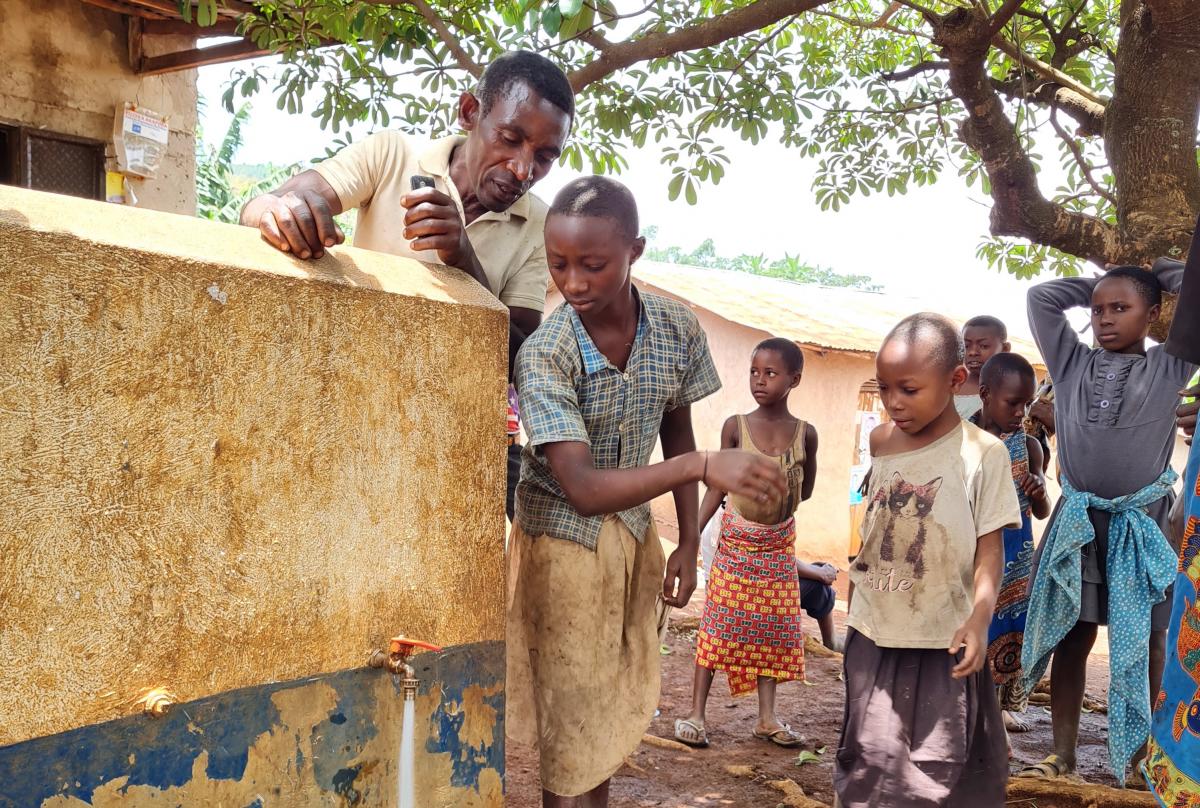
This was a collaborative effort with Naomi Kabarungi. Thanks also to Jane Nabunnya Mulumba and Martin Watsisi for all their contributions and inputs and to Angela Huston and Tettje van Daalen for the review.
Every person in the world should have safe and adequate water for drinking, sanitation, and hygiene needs. Safe water is an essential human right and also a prerequisite for the realisation of other human rights (Resolution A/RES/64/292. United Nations General Assembly, July 2010). Thus, governments, service providers and other stakeholders have the duty to provide safe, clean, accessible, and affordable drinking water and sanitation for all. Kabende sub county in the north of Kabarole district in Western Uganda is home to over 12,000 people, and they too must not be excluded from accessing their rights to safe water and sanitation.
Kabende is one of the 20 sub counties that form Kabarole District Local Government and is home to more than three percent of Kabarole's population. They solely survive on subsistence farming and eke a living from supplying surplus maize and potatoes to the regional food markets. Like in many other rural areas in Uganda, the people in Kabende depend on seasonal rainfall for all their major water supply needs, including agriculture and domestic use.
Rainfall in Kabende is low and unreliable compared to other parts of Kabarole district. River Sogahi is the only source of water for the Kabende community. The river water is not only insufficient but also contaminated and unsafe for domestic use. Kabende is identified as one of the sub counties with the least access to water, sanitation, and hygiene services in the district. See Kabarole District WASH (Water Sanitation and Hygiene) Master Plan 2018-2030.
But delivering sustainable WASH services is more than turning on a tap: it is becoming increasingly clear that water, sanitation, and hygiene services are delivered not only through infrastructure, but through an underlying support system that keeps infrastructure productive and efficient. This requires strong WASH systems at local and national levels, and collective action and change involving all the people who make up the system. Systems are the networks of people, organisations, institutions, and resources required to deliver sustainable WASH services.
Several bureaucratic, social, technical, and financial factors constantly interact and thus impact the service delivered. IRC supports this collective action through the 'Change Hub' by supporting learning alliances and local solutions while acting as a backbone to each partnership, and helping local leaders lead and coordinate partners, facilitate relationships, provide expertise and monitoring, help share learning and ensure continuous communication among partners. IRC supported Kabarole DLG (District Local Government) to prepare the WASH Master Plan for the district. The plan not only accentuated the glaring deficiencies in the least served areas such as Kabende but also helped the district elaborate its vision, identify opportunities, lay down an elaborate plan and determine the cost of achieving 100% coverage.
"The Kabarole District WASH Master Plan is a milestone, an artifact of a political and social process. Its development was also an intervention, one guided by our belief that such processes and products are essential tools in generating and binding political engagement and supporting collective action,"
Jane N. Mulumba, Country Director IRC Uganda.
IRC Uganda is a long-standing partner that continues to support Kabarole district to popularise and implement the plan towards the vision of access for all. The master plan among other strategies for action proposes private-public partnerships (PPP) to increase investment in, and delivery of WASH services, leaving no one behind. In 2019, IRC Uganda facilitated a PPP between Kabarole DLG, National Water and Sewerage Corporation (NWSC) and IRC, to extend a piped water system from Kijura Town Council to supply Kabende sub county beyond the semi-urban centre to the rural areas.
The Conrad N. Hilton Foundation and Waterloo Foundation have provided funds to IRC Uganda to support Kabarole DLG to implement the WASH master plan in three areas:
Through a series of interviews with service providers, users, local leadership and the district technical team, we share some of the challenges and successes they have experienced in the work they have done.
Stories as told by - Engineer Basudde Bruno, the District Water Engineer for Kabarole, Michael Tumubwine, the NWSC Area Manager for Kijura Town Council in Kabarole District, Mary Nyangoma, a Nursing Assistant and Infection Prevention and Control (IPC) Focal Person at Kabende Health Centre III and James Katushabe, the local council chairperson of Kabende sub county (LCIII).
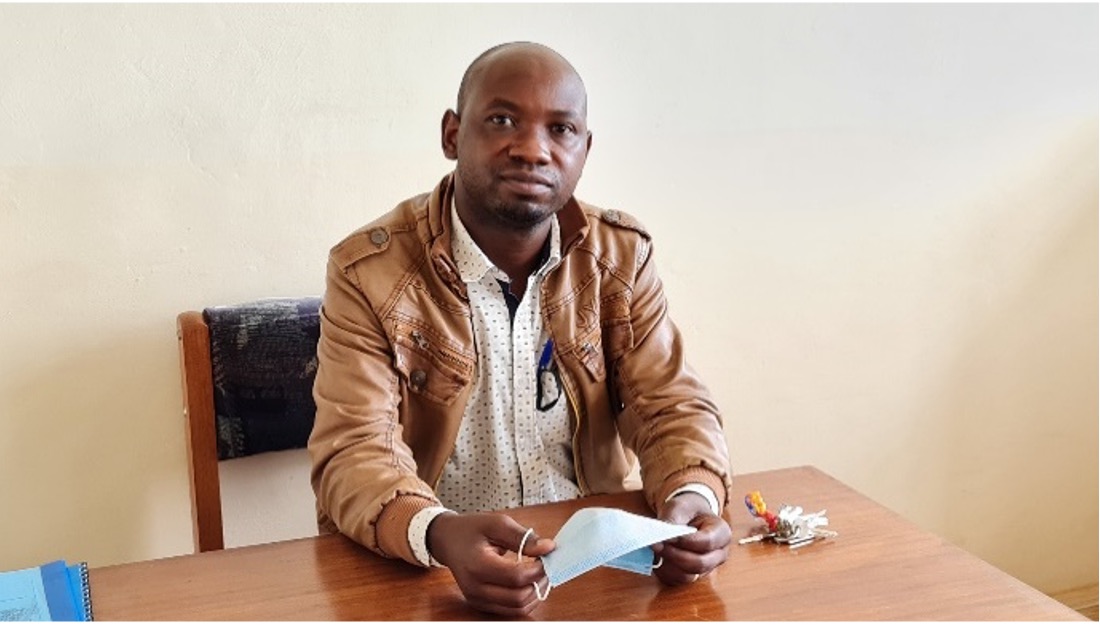
Engineer Basudde Bruno
I am Engineer Basudde Bruno, the District Water Engineer for Kabarole, whose area of authority covers Kabende. Kabende is one of the geographically water-stressed areas and suffered rebel insurgence of the Allied Democratic Forces (ADF) in the mid-1990s. I recall that between 2017 and 2018, the area experienced severe drought, which caused food insecurity and deaths in the community.
Government responded by introducing an irrigation scheme in Masongora village serviced by River Sogahi to ensure food security and enhance agricultural production in the area. While the agricultural investment was a priority under the circumstances, safe WASH services for the community remained a low priority.
People fetched dirty water from River Sogahi and used the irrigation water collected directly from the irrigation inlets to their gardens, rather than trek to and from the community boreholes that were far off. "Now they are giving us water for irrigation when we don't have water to drink", they lamented.
Scientific tests on the underground water resources showed presence of E. coli, meaning the water was unsafe for home consumption. There was an outbreak of disease like bilharzia. We realised that the cost of treating the water, and operation and maintenance would be an unsustainable venture for the district. Moreover, Kabende being a non-urban location, with a small population of isolated households that are not willing nor able to pay, was not a viable business for National Water and Sewerage Corporation (NWSC) to get them a piped water extension.
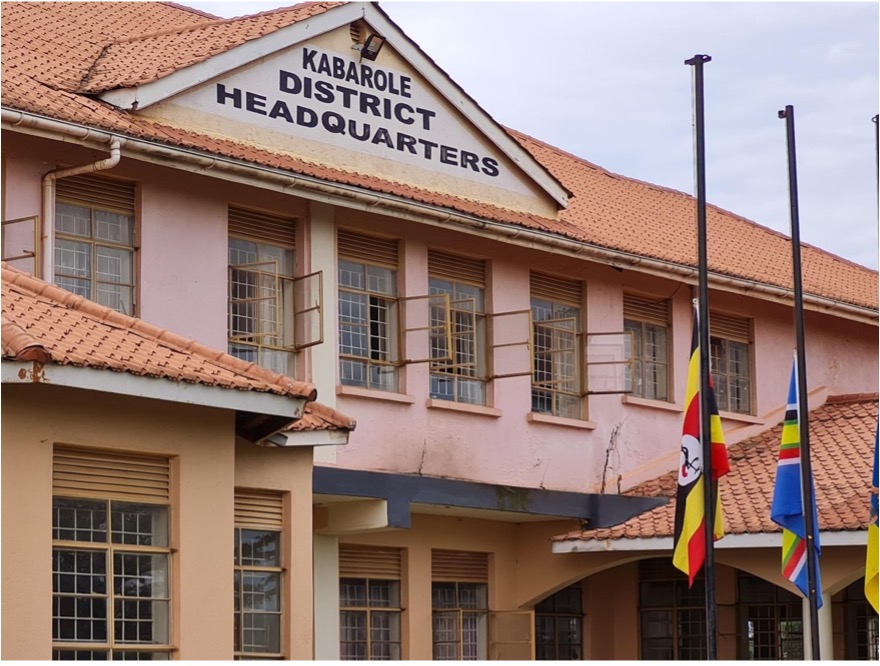
Kabarole District Headquarters
That is how the PPP with the DLG, NWSC and IRC came into place to undertake a phased project to cover the least served parishes in the district at a total budget of UGX 270m (USD 76,187.22). Kabarole DLG and IRC committed funds upfront. This was an initial budget of UGX 185M (approx. USD 5,000). IRC has so far supported with UGX 72M (approx. USD 19,200) and UGX 39M on the way for completion. In total IRC will spend about USD 30,000. This amount from IRC is for materials and installations, while NWSC committed technical resources for meeting the costs of labour and procurement, as well as lifetime operations and maintenance structures for the project. Masongora parish in Kabende, was the first beneficiary and is now equipped with a public water supply stand in the village centre. The water stand provides water at a highly subsidised cost of UGX 100 per jerrycan of 20 litres and is operated as a small business by a local community member who remits 60% to NWSC and retains profits of 40%.
We engaged and consulted with the community at the start of the project, and they confirmed the urgent need for safe water services. Other than the water fees, there have not been any complaints about the tap stand at Masongora but on priorities at household level where expenditure on water is considered too high in relation to other needs, and besides 'free' water was also available in the river. Even when we tell them that this water is contaminated, their typical response is. "Ahh, but we have been drinking this water since we were born."
Meeting the 30% water access/use target for the project is therefore a challenge amidst such community attitudes and priority spending at household level. When one looks at a person's income versus the cost of connecting the water, one will see that this person just does not know the benefits of access to safe water. There is a need to continue sensitisation so that people can appreciate the value and accept to pay, and therefore help the NWSC to provide a sustainable service.
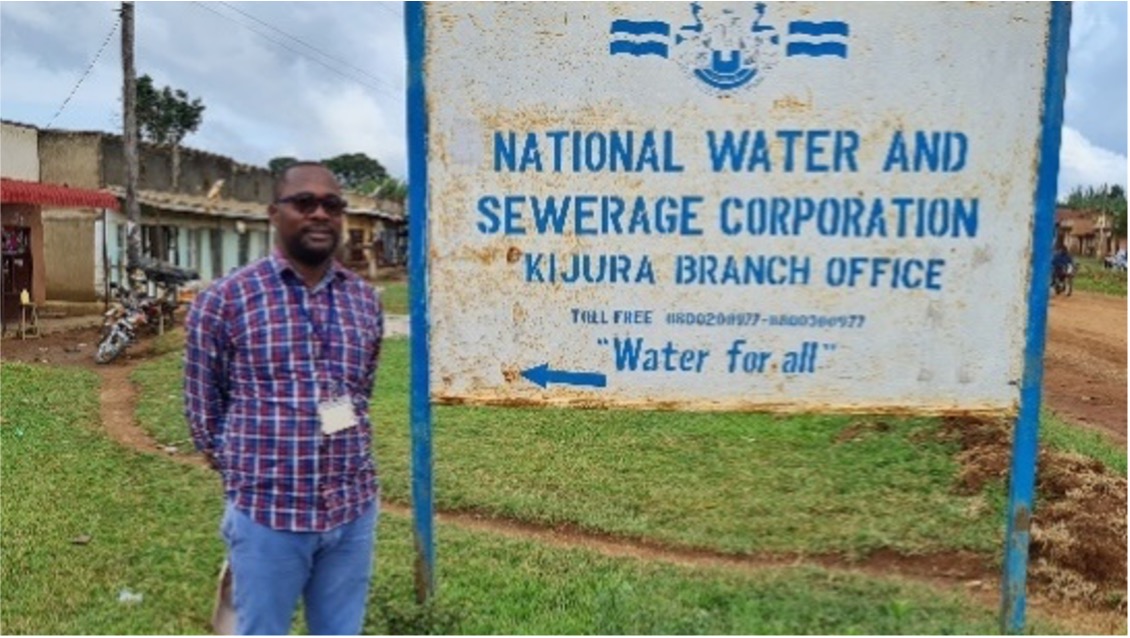
Michael Tumubwine
My name is Michael Tumubwine, I am the NWSC Area Manager for Kijura Town Council in Kabarole District. National Water and Sewerage Corporation (NWSC) is the government entity mandated to provide water and sanitation services to urban centres, and our mission is 'to sustainably and equitably provide cost-effective quality water and sewerage services to the delight of all stakeholders while conserving the environment.' The NWSC operates a business model where the customer is king. The partnership with Kabarole District Local Government and IRC opened our eyes to the opportunity in Kabende, and we are happy to report that the Health Centre III and schools within the sub county have been good paying customers.
Through the partnership with Kabarole DLG and IRC, we have extended piped water to Masongora which though rural, is an agricultural business area with a population that can pay for a subsidised service. The need in Masongora has been huge. The only water available has come from the River Sogahi and is used for irrigation, but the community is still using it for drinking and cooking because it is free of charge.
We set up a public tap stand in the local centre in Masongora, and users pay only UGX 100 (USD 0.02) per jerrycan. It is much nearer than the stream (River Sogahi) and therefore people can save their time for productive work instead of collecting water.
However, we still have challenges with the population's mindset. Someone will say, "Since my birth I have been drinking water from this stream, so how can you convince me at my age not to?". Most believe that water should be for free and cannot understand why they should pay the minimal cost. They still prefer the "free" source which exposes them to infection and disease.
Together with the district and local leaders, we have continued to create awareness on the importance of using safe piped water. The statistics from Kabende Health Centre III show a decline in waterborne diseases which means we are making substantial progress. However, most of the users in the village have not yet adapted to automated payment systems such as mobile money and therefore do not pay their bills promptly. To mitigate the problem, we sometimes collect the money physically and pay this into the bank on behalf of the customers.
Kabende has shown the potential to provide good business for NWSC. The community interest in the piped water supply is increasing. For instance, they often ask; "It has been off for two days, what is the problem?", indicating that they need the service.
NWSC's key role is to extend clean, treated piped water coverage in the community, through standpipes and domestic connections eventually.
The PPP model is replicable in other areas and NWSC is in discussion with Kabarole DLG to extend water in the areas of Muhoire, Ntezzi, and Nyabusenyi 1 villages.
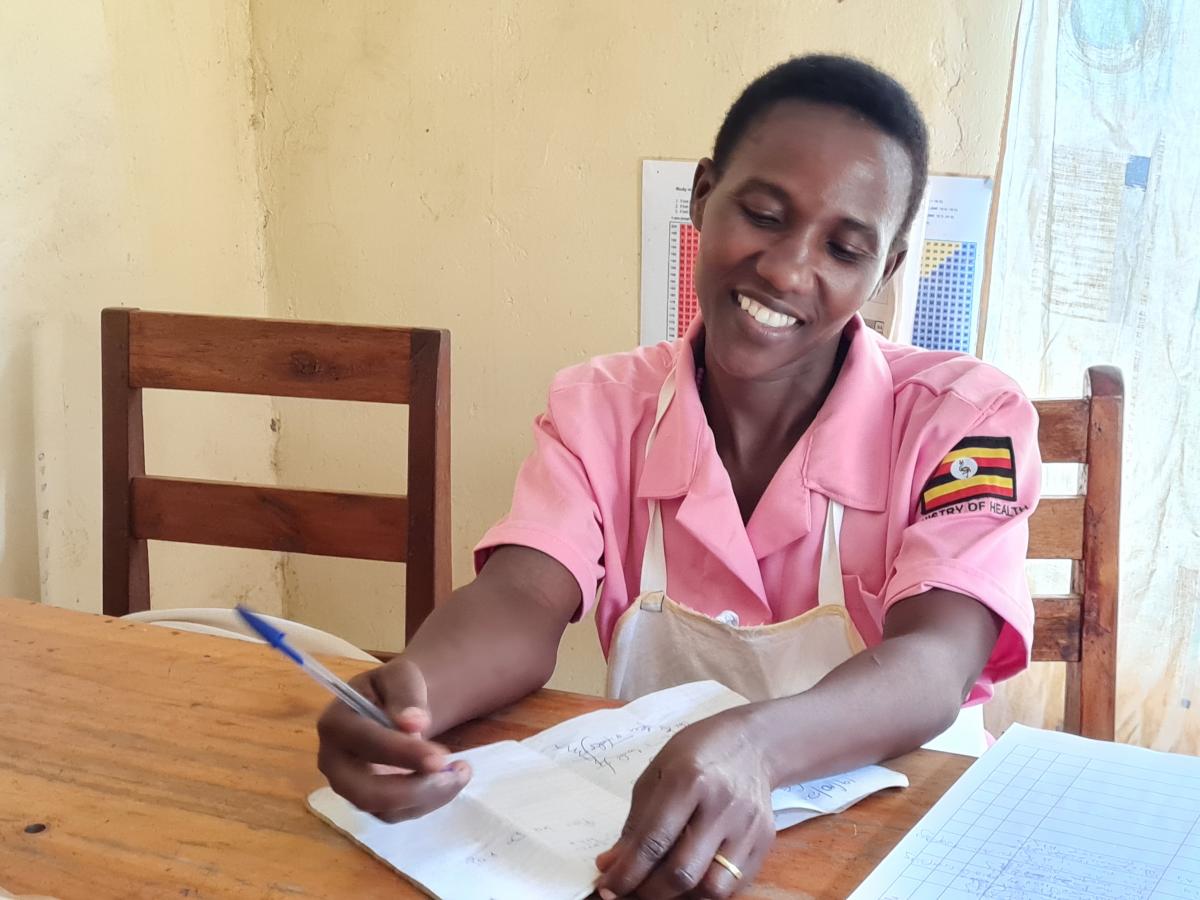
Mary Nyangoma
My name is Mary Nyangoma, I am 37 years old, and a Nursing Assistant and Infection Prevention and Control (IPC) Focal Person at Kabende Health Centre III. I have worked 9 years at this facility, and 14 years in public service.
About a year ago we did not have piped water at the health centre. We would send someone to collect a 20L jerrycan of water at UGX 1,000 (USD 0.28) in the dry season and UGX 500 (0.14 USD) in the rainy season. They would fetch it from the borehole about 5km uphill.
Since we got the NWSC piped supply water, the hygiene situation at Kabende HCIII has improved. The pressure is good, and it is clean water, at least to the eye. The tap is right here in the compound, even get as much water as possible before it closes again.
We do not have storage tanks. We can only fill the few jerrycans we have, and the handwashing cans (10L).
It is not possible to store enough when the supply is flowing; they release the water for a maximum of an hour, there is much demand and then it is also not planned. At times we still must send for water from the borehole – the same way we did when we had no piped water. Occasionally it comes when we have paid for water from the borehole, so people have lost interest.
It would be helpful if NWSC communicates the time when they plan to release water, then we would make schedules to fetch it. We do not have dedicated staff in charge of the water stock nor a budget for buying the water, so the task of collecting water is done voluntarily by cleaners, who also get tired and have other priorities. They get and ration their water according to their duty needs.
A health centre needs flowing water all the time. Both our staff and clients need water for handwashing at critical points, personal hygiene, and administering urgent medicine. We make our water safe for drinking by boiling or filtering. These activities are happening all the time; that means that every time the taps are dry, our staff and patients are exposed to risks of infection and delayed response to their health needs.
We have reached out to NWSC through our local leaders at the sub county office. They say that the water is rationed so that more people can be served in the community. I appreciate that, but I wish that the health centre would be given priority. Instead, they can regulate supply by giving reduced pressure on the water flow but keeping it consistently available on tap. It would help me stay focused on the core job to serve our customers.
Before we got the direct water supply to our compound, Kabende HCIII had an intake of about 75-100 cases of hygiene-related infections. Now it is as low as 20 and not more than 40. People wash their hands more regularly and the toilets are cleaned, with handwashing points at the entrance in compliance with COVID-19 Standard Operating Procedures.
Without NWSC we spent UGX 6,000 (USD 1.70) to the water vendor for water collected per day. Complaints of diarrhoea and typhoid were common here at the Kabende Health Centre III, but the situation has improved. We think that if the water supply is consistent and is also extended to those communities far from the town where our clients come from, this would deter most infections caused using untreated and unsafe water.
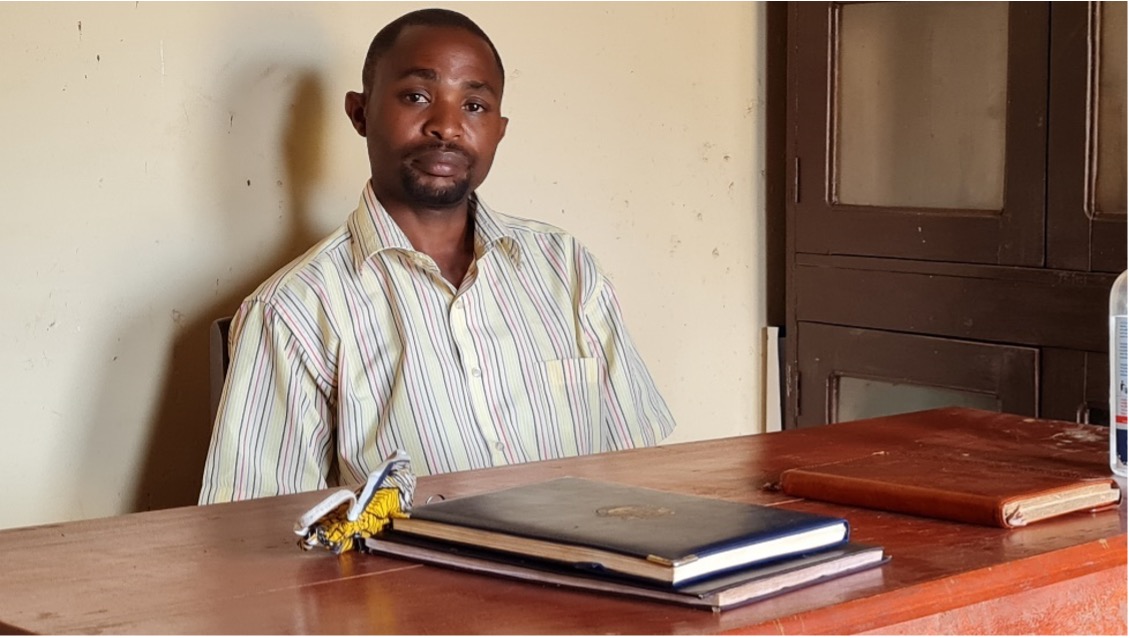
James Katushabe
My name is James Katushabe, and I was re-elected to the office at the beginning of 2021 as the local council chairperson of Kabende sub county (LCIII). People voted for me because of my passion for hygiene and sanitation in the community. I am not just a talker, I am a politician who also takes action. I was happy when the water reached Kabende in March 2020. However, there were complaints of inconsistent supply right from the start.
As a leader, I consulted NWSC, the service provider. I was told by the officials that 'the challenge was too much pressure caused by the gravitational force as the water slopes to Kabende, causing the pipes to burst time and again.' NWSC has fixed the problem with a 'brake pressure pump,' but this has resulted in them controlling the supply of the water, and only turning it on at their will. This has posed another problem for the people. The water is not readily available for convenient use by them. What is the point of investing in a project (the PPP) if people cannot have access to water all the time?
Water is essential for facilities such as the Kabende Health Centre III, Kabende Muslim Standard School with about 140 pupils and the Masongora Primary School with an enrolment of 283 pupils, especially in these days of the COVID pandemic. Yet the facilities still have to buy at a higher price from the water vendors who collect it from the far-off borehole.
The public tap stand at Masongora is good and the fee is affordable. But I want my people to be ambitious and ask for more because it is their right, and it is possible. My desire would be that at least in every household, there should be piped water in every home. As the community advances, households will have flush toilets, and better housing facilities. Water needs to be regular to attract such investments and improvements in the local community. I would love to stay in a place with a very good road and a good school for my children to attend.
A group of people fetching water from a well Description automatically generated with medium confidence. The demand and consumption of piped water is evident in Kabende. It is estimated that one hundred jerrycans are dispensed daily for domestic use (LC1 Chairman report). There is an urgent need to extend the service to water stressed areas such as Karuteete, one of the twenty-eight villages in Kabende sub county. There is a disconnect between the service providers and the political leaders. Users at the public tap stand, said they expected free water, because the politicians promised it if they voted for them. The community needs to be helped to understand that for the taps to flow for good, the source must be maintained, and this costs money.